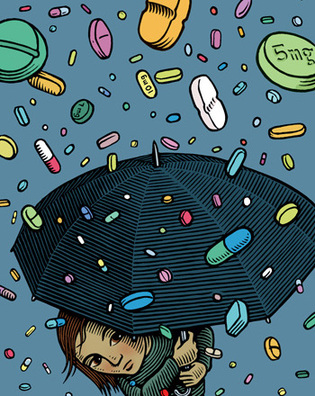 loading
loading
ForumA landscape of overmedicationAre US doctors too quick to prescribe? Charles Barber, a lecturer in psychiatry at the School of Medicine, is the author of Songs from the Black Chair: A Memoir of Mental Interiors, and Comfortably Numb: How Psychiatry is Medicating a Nation.  Gregory NemecView full imageIn my two decades of work counseling the mentally ill homeless, I have witnessed the lifesaving impact of psychiatric drugs for people who really need them, people with true medical illnesses like schizophrenia, bipolar disorder, and major depression. Many of the severely ill clients that I worked with would not have survived without such medications, from antidepressants like Prozac to antipsychotics such as Zyprexa. But in our characteristic American impatience and zeal, these drugs, particularly initially, were hyped beyond the limits of their ability to help many people. Their efficacy with very specific populations and legitimate psychiatric disorders has been over-generalized to treat, in many cases, the life problems and life stressors of the masses. Indeed, antidepressants are now the most prescribed category of drugs in this country. Technically, three events conspired to create the current landscape of overmedication. The most significant development was the mid-1990s change in regulation that allowed the television advertising of prescription drugs. Before that, TV ads for drugs were illegal, and they remain so everywhere in the world other than the United States and New Zealand. The ads, which quickly became omnipresent in prime time, made the 20 or so "blockbuster" drugs household names, and arguably, household commodities. That Claritin and Zoloft and Nexium were advertised next to Coca-Cola and toothpaste gave the impression that they were household products. Research has shown that doctors, under pressure from consumers influenced by the latest ad ("Ask your doctor about [fill in the blank]"), will write prescriptions at times even if they feel ambivalent about the appropriateness of the treatment. The second development was the expansion of managed care, which hit its stride in the early 1990s, not long after Prozac and its ilk were put on the market. Managed care has consistently made it more difficult for patients to see therapists for mental health problems and has increasingly cast its lot with prescriptions. As a result, family doctors now prescribe the majority of antidepressants. The third development, unique to psychiatry, has been the extraordinary expansion of diagnosis. The first diagnostic manual in psychiatry, dating to the 1950s, had about 50 diagnoses; the latest version of the Diagnostic and Statistical Manual of Mental Disorders (DSM) offers over 300. One will find in its pages diagnoses and categories and codes for such conditions as "Adjustment Disorder" or "Sibling-Relational Problem" or "Phase of Life Problem." No doubt these are legitimate and very painful problems, but are they mental illnesses? The next version of the DSM, due out in 2012, will offer even more putative diagnoses. All of the above has created a confusion between severe mental illnesses and lesser conditions, which would often be better served by readily available, lower-tech, nondrug solutions. One sees this most pointedly in the difference between "Depression" and "depression." Depression, or Major Depressive Disorder, is a malevolent disease whose sufferers are unable to feel any pleasure whatsoever, typically can't sleep or eat, and are at high risk for hurting themselves. So brutal is the illness that at times the highest risk for suicide is not at the abyss of the depression, but actually when patients start to feel a little better and can therefore muster the energy, which they lacked before, to kill themselves. To compare Depression to its everyday cousin, depression—meaning the "blues," being "bummed out," it's March and snowing out and I'm feeling sad—is to compare a destructive typhoon to a gentle spring rain. Or as William Styron, a famous Depression sufferer himself, wrote: the term depression "has slithered innocuously through the language like a slug, leaving little trace of its intrinsic malevolence, and preventing, by its very insipidity, a general awareness of the horrible intensity of the disease when out of control." In our single-minded focus on drugs, we've overlooked other approaches for milder forms of depression. The British National Health Service counsels that doctors advise "watchful waiting," changes in diet, exercise, self-help, and brief stretches of therapy as treatments of first choice. If those approaches do not work, then antidepressants are advised. In America, our approach appears to be the opposite: antidepressants, and then, possibly, therapy and lifestyle changes. One form of therapy—cognitive therapy, the most empirically validated form of therapy in the world—has been shown to have comparable outcomes to antidepressants', but with lower relapse rates. Cognitive therapy also is free of side effects, unless one counts the homework required between sessions—homework that helps patients examine the thoughts and beliefs that can underlie their depressed and anxious moments, and helps teach them the skills to master such difficulties in the future. But the British approach probably won't fly here. We see too many TV ads, and we're too enamored of the expedient and the easy to look at other approaches for mastering the "depression" of our times.
The comment period has expired.
|
|